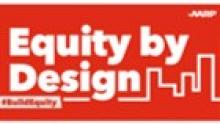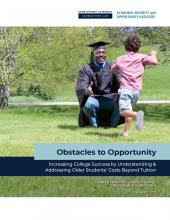Found 110 resources.
0
0
0
Developed by listening to our community, the Alliance has compiled seven hallmarks that make up a person-first health system.
Topics: Advocacy, Community development, Health, Healthy homes, Medicaid / Medicare
 Shared by Molli Caite Hughes
on Dec 6, 2023
Shared by Molli Caite Hughes
on Dec 6, 2023 0
0
0

Play is not only beneficial but essential for people of all ages. Today, there is increasing interest in the benefits of not only play itself, but specifically people from younger and older generations playing together. The built environment in our communities plays a critical role in facilitating this intergenerational engagement and play. Approaches such as Intergenerational Contact Zones (ICZs) introduce strategies for promoting social inclusion and belonging, employing novel ways of planning and designing public spaces to create intergenerationally enriched environments that provide...
Topics: Community development, Dual-generation, Exercise, Health, Seniors, Youth
 Shared by Sandra Ware
on Jun 8, 2023
Shared by Sandra Ware
on Jun 8, 2023 0
0
0

ASTHO comes to our health agencies and partners saddened by our country's recent mass shooting. We mourn the losses of life from firearm violence as our families, schools, and communities continue to be impacted. ASTHO supports you now more than ever. The epidemic of firearm-related injury and death in the United States has become a critical public health and safety concern that affects everyone.
Topics: Community development, Criminal justice, Health, Mental health, Research
 Shared by Sandra Ware
on May 25, 2023
Shared by Sandra Ware
on May 25, 2023 0
0
0

Climate change will affect everyone, so what measures can U.S. communities take now to adapt and thrive? From water-saving landscapes to strategic retreats from hazard-prone areas, experts Colleen Moore and Alexis St. Juliana explore a range of promising responses they’ve identified and explain why historically vulnerable communities must be part of the solutions.
Topics: Community development, Energy, Environmental Resiliency/Climate Change, Green, Housing, Low-income, Research, Sustainability
 Shared by Sandra Ware
on Mar 30, 2023
Shared by Sandra Ware
on Mar 30, 2023 0
0
0
According to UN-Habitat, the world needs to build 96,000 affordable homes every day to address the
global housing crisis by 2030. Yet, better utilizing existing housing stock—through options such as shared
housing—can make a significant dent in the need to build more housing. With college students often
challenged to find affordable housing and many older adults living alone in homes with spare bedrooms,
these two groups are increasingly benefitting from living together. Universities are often well-suited to
facilitate students living and learning with older adults in nearby communities...
Topics: Community development, dual-generation initiative, Funding, Health, Homelessness, Housing, Mental health, Seniors, Youth
 Shared by Sandra Ware
on Oct 25, 2022
Shared by Sandra Ware
on Oct 25, 2022 0
0
0
Looking largely at the 2020-2021 school year, the report is chock-full of information about how schools apply research-based strategies in a variety of different contexts – from very different school systems across multiple states – to make research translate into positive experiences and outcomes for students and their teachers in three critical areas:
• Instructional work, where math or English-language-arts teams, including instructional coaches, special-education teachers, and English learner/multilingual teachers, work to improve the quality of instruction within classrooms.
• Early...
Topics: Advocacy, Attendance, Child welfare, CLPHA, Community development, Education, Grade-level proficiency, Housing, Literacy, Low-income, Partnerships, Place-based, Supportive housing, Sustainability, Youth
 Shared by Karina George
on Jun 29, 2022
Shared by Karina George
on Jun 29, 2022 1
0
0
The Administration for Community Living’s Aging and Disability Network is a multifaceted service infrastructure for older adults and people with disabilities so they can find housing and obtain services like chore assistance, delivered meals, and transportation. By partnering with this community infrastructure, PHAs can improve voucher utilization and leverage and align resources so older adults, people with disabilities, and people experiencing homelessness —all priority populations for federal housing assistance—can obtain supportive services needed to attain housing stability, optimize...
Topics: Advocacy, Community development, Disabilities, Health, Housing, Partnerships, Research, Seniors, Supportive housing, Sustainability
 Shared by Karina George
on Jun 17, 2022
Shared by Karina George
on Jun 17, 2022 0
0
0
Tim Higashi and Stuart M. Butler look at several examples of innovative ways in which communities responded to COVID-19 by using a variety of special techniques to “braid and blend” funds from different programs and sources to address pressing health, education and other service need. They argue that such special flexible budgeting techniques should not end with the pandemic, but should become an integral feature of budget procedures to enable communities to reach social goals
Topics: Advocacy, Community development, COVID-19, Data sharing, Funding, Legislation & Policy
 Shared by Housing Is
on May 25, 2021
Shared by Housing Is
on May 25, 2021 0
0
0

Higher education offers millions of people the opportunity to improve their financial well-being. However, higher education is prohibitively expensive and can saddle people with insurmountable debt. Costs beyond tuition—such as housing, food, child care, and transportation—are large, essential components of the cost of attending college for students. In order to better understand how these living costs add up and vary, this report offers estimates of costs beyond tuition for older students between the ages of 25 – 45, who make up roughly one-third of college students and face unique barriers...
Topics: Attendance, Community development, Education, Housing, Post-secondary, Stability, Workforce development
 Shared by Housing Is
on May 20, 2021
Shared by Housing Is
on May 20, 2021 0
0
0
The devastating consequences of climate change will continue to impact our everyday lives, testing the resilience of our communities and influencing the processes of how we build housing. PHAs have been on the front-line managing disaster recovery efforts and are well-positioned to be leaders in advancing policies to develop environmentally friendly green infrastructure. This panel will discuss past endeavors to secure safe housing for displaced communities, what steps are required to mitigate future disasters, and how PHAs are designing plans to make greener and more healthier communities.
Topics: Community development, Green, Housing
 Shared by Housing Is
on May 18, 2021
Shared by Housing Is
on May 18, 2021 0
0
0
As public housing authorities have worked to keep residents and staff safe from COVID-19, they have turned from focusing on emergency response to longer-term solutions. Sub-grantees from CLPHA’s partnership with the Center for Disaster Philanthropy share how they have been implementing initiatives to counter the digital divide that has only been exacerbated by the pandemic.
Topics: Advocacy, Broadband, Community development, Education, Low-income
 Shared by Housing Is
on May 18, 2021
Shared by Housing Is
on May 18, 2021 0
0
0
Meet with members of CLPHA’s Postsecondary Leadership Institute to learn about how PHAs and postsecondary partners are working with students. Attendees will have a chance to hear short presentations about innovative approaches for improving postsecondary success and then ask questions in small groups.
Topics: CLPHA, Community development, Data sharing, Partnerships, Post-secondary
 Shared by Housing Is
on May 18, 2021
Shared by Housing Is
on May 18, 2021 0
0
0
After over a year of remote learning, everything is out-of-school time at this point. With unknowns about vaccinations for children, communities should prepare for uneven plans across communities for summer and fall 2021. This discussion session focuses on capacity: how to support virtual and hybrid learning, how to counter learning loss, supporting parent engagement, supporting staff to support parents, providing adult socio-emotional learning, and providing connection to services. Panelists will share examples from on the ground, toolkits, and other resources, while also allowing time for...
Topics: Attendance, Child welfare, Community development, Early childhood, Education, Grade-level proficiency, Out-of-school time, School-readiness, Youth
 Shared by Housing Is
on May 18, 2021
Shared by Housing Is
on May 18, 2021 0
0
0
Roundtable: Cross-Sector Efforts on COVID-19.
More than a year into a global pandemic, we continue to see disparities in infections, access to care, and economic supports, with an unequal burden on low-income and communities of color. This roundtable will discuss perspectives from housing, health, and policy for what we have seen and what may be to come, as well as ideas we may enact to create more permanent solutions, in addition to addressing current crises.
Topics: CLPHA, Community development, COVID-19, Education, Health, Housing, Partnerships
 Shared by Housing Is
on May 18, 2021
Shared by Housing Is
on May 18, 2021 0
0
0
Colleges support students with advising, counseling, or coaching in academics and other skills they need to succeed in school. Some colleges enhance those services through reduced adviser caseloads and more comprehensive, frequent guidance, which can improve students’ semester-to-semester retention and average credits earned. This overview describes important lessons on designing and implementing those services. College leaders and administrators committed to designing, building, managing, and continually supporting enhanced advising services can consult this checklist of recommendations as...
Topics: Attendance, Child welfare, Community development, Education, Grade-level proficiency, Post-secondary, Workforce development
 Shared by Housing Is
on Mar 4, 2021
Shared by Housing Is
on Mar 4, 2021 0
0
0
During the COVID-19 pandemic, service coordinators played a pivotal role in the support of older adult residents of publicly funded housing properties. Some independent housing operators employ service coordinators to increase residents’ self-sufficiency, physical security, social connections, and the delivery of long-term community-based supportive services. This report presents results from a survey conducted between June 23 and July 17, 2020 to explore the experiences of these service coordinators during the early months of COVID-19. At the time of the survey, about one-third of...
Topics: Community development, Housing, Mental health, Seniors
 Shared by Housing Is
on Dec 3, 2020
Shared by Housing Is
on Dec 3, 2020 0
0
0

As housing costs have escalated and inequities persist across the country, many young people need flexible, empowerment-based investments to get stably housed and onto a path to thriving. To this end, direct financial assistance (“cash transfers”) with other supports offer a promising solution grounded in a robust global evidence base. The circumstances of COVID-19 amplify the importance of developing and evaluating youth-informed approaches to doing things differently.
This report shares results and implications of a year-long research and stakeholder engagement process that Chapin Hall...
Topics: Community development, Funding, Homelessness, Housing, Low-income, Youth
 Shared by Housing Is
on Nov 3, 2020
Shared by Housing Is
on Nov 3, 2020 0
0
0
The National Initiative on Mixed-Income Communities of the Jack, Joseph and Morton Mandel School of Applied Social Sciences of Case Western Reserve University has launched a new podcast.
The new podcast, “Bending the Arc” is hosted by Dr. Mark Joseph and Dr. Amy Khare.
Join us to learn about strategies to make communities diverse, vibrant places of well-being and opportunity. Listen to the trailer and the first three episodes wherever you listen to podcasts.
Topics: Community development, Healthy homes, Vision
 Shared by Housing Is
on Oct 29, 2020
Shared by Housing Is
on Oct 29, 2020 0
0
0
Over the past year, the United States Conference of Mayors and the Brookings Institution, along with the Project for Public Spaces have worked together to capture a new model of growth that is emerging in cities and the particular roles that mayors can play.
This handbook offers concrete strategies for mayors and their administrations to facilitate the rise of innovation districts—small geographic areas within cities where research universities, medical institutions, and companies cluster and connect with start-ups, accelerators, and incubators. They reflect profound market and demographic...
Topics: Community development, Legislation & Policy, Research, Workforce development
 Shared by Housing Is
on Oct 20, 2020
Shared by Housing Is
on Oct 20, 2020 0
0
0
Chicago’s troubling homicide rate could be significantly reduced through a massive increase in state spending for Chicago schools. That's just one of the proposals floated Monday by a prominent University of Chicago economist Jens Ludwig. With a substantial commitment, he says homicides could be reduced by nearly 60 percent. Illinois is dead last when it comes to the percentage of education dollars provided by the state to its cities. Ludwig believes adding $1.7 billion dollars would not only bring Illinois up to the national average, but could substantially reduce gun violence as well....
Topics: Child welfare, Community development, Education, Funding, Legislation & Policy, Preventative care, Youth
 Shared by Housing Is
on Oct 15, 2020
Shared by Housing Is
on Oct 15, 2020 0
0
0
One Summer Chicago Plus is a jobs program designed to reduce violence and prepare youth living in some of the city’s highest-violence neighborhoods for the labor market. This study was carried out over the summer of 2013 in partnership with the Chicago Department of Family and Support Services. It found that the program, which provided a six-week, minimum-wage job for 25 hours a week, reduced the number of violent-crime arrests for participants by 33 percent over the subsequent year. The One Summer Chicago Plus 2013 study—accompanied by a long-term follow-up of the 2012 program—closely...
Topics: Child welfare, Community development, Criminal justice, Out-of-school time, Partnerships, Preventative care, Safety, Youth
 Shared by Housing Is
on Oct 15, 2020
Shared by Housing Is
on Oct 15, 2020 0
0
0
Federal, state, and local policies focused on neighborhood improvement have long emphasized the need for community organizations to share information, coordinate activities, and collaborate in the delivery of services. These partnerships build “community capacity,” as a way of promoting local problem solving and community well-being over the longer term. But, there has been only limited research on which patterns of neighborhood networks are most conducive to implementing effective collective work. This report uses social network analysis, drawing from a network survey, and extensive field...
Topics: Communications, Community development, Data sharing, Legislation & Policy, Partnerships
 Shared by Housing Is
on Oct 15, 2020
Shared by Housing Is
on Oct 15, 2020 0
0
0

Trends in Housing Assistance and Who it Serves
Topics: Community development, Disabilities, Education, Funding, Health, Homelessness, Housing, Legislation & Policy, Low-income, Partnerships, Research, Seniors, Workforce development, Youth
 Shared by Keely Stater
on Sep 10, 2019
Shared by Keely Stater
on Sep 10, 2019 0
0
0

Rental affordability is a significant challenge for metropolitan statistical areas (MSAs) across the United States. The vast majority of the units Freddie Mac finances are affordable. Even so, our research shows that supply just hasn’t kept pace with demand in many metros, and that’s pushing affordable rents out of reach for millions of American families.
Topics: Community development, Housing, Research
 Shared by Housing Is
on Jun 5, 2019
Shared by Housing Is
on Jun 5, 2019 0
0
0
Although today’s U.S. labor market is strong and unemployment is low, many working-age American remain marginalized. As communities across the country grapple with the challenges of an ever-evolving labor market, this report provides a framework for local leaders to grow good jobs through industrial development strategies that are based on their regions’ unique capabilities.
Topics: Asset building, Community development, Legislation & Policy, Workforce development
 Shared by Housing Is
on May 24, 2019
Shared by Housing Is
on May 24, 2019 